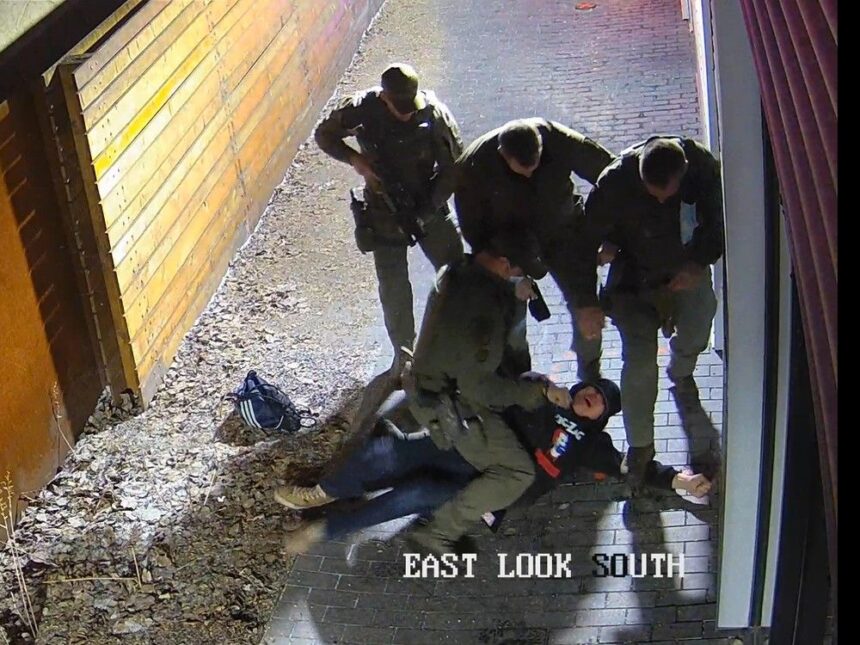The recent acquittal of a former Edmonton police officer has sparked significant conversation throughout our community about police conduct and accountability. Last Friday, former constable Curtis McCargar was found not guilty of assault after an incident where he kicked a man in the head during an arrest in August 2019.
As I watched community members discussing this case at Transcend Coffee on Jasper Avenue yesterday morning, I couldn’t help but notice the mixture of reactions. Some expressed relief at the verdict, while others voiced concerns about what this means for police oversight in our city.
The case centered around McCargar’s response during what court documents described as a high-stress situation. According to testimony, McCargar and his partner were attempting to arrest a suspect who had fled from them. When they finally apprehended him near 115 Street and 105 Avenue, McCargar delivered what the prosecution characterized as a “soccer-style kick” to the suspect’s head.
“The facts of this case required careful consideration of use-of-force protocols within the context of rapidly evolving police scenarios,” said criminal defense attorney Maria Sanchez, who has observed several Edmonton police conduct cases over her 15-year career. “The court ultimately had to determine if the officer’s actions fell within reasonable bounds given the totality of circumstances.”
Court testimony revealed that McCargar, who has since left the Edmonton Police Service, maintained that his actions were necessary given the perceived threat level and the suspect’s reported non-compliance. The court agreed, finding insufficient evidence to conclude the force was excessive under the circumstances.
Tom Drake, chair of the Edmonton Police Commission’s public engagement committee, explained that these cases highlight the complexity of police oversight. “While we can’t comment on specific court decisions, the commission remains committed to ensuring that use-of-force incidents receive appropriate review and that our policies reflect community expectations regarding police conduct.”
The Edmonton Police Service has faced increased scrutiny in recent years regarding use-of-force incidents. According to data from the Alberta Serious Incident Response Team, Edmonton has seen approximately 27 serious police conduct investigations in the past three years, though the majority did not result in criminal charges.
Community advocates like Samantha Wills from Edmonton Citizens for Police Accountability view this case as part of a broader pattern. “This verdict sends a troubling message about what’s considered acceptable police behavior,” she told me during a community forum at the Stanley A. Milner Library last weekend. “Many Edmontonians are left wondering if our oversight systems are truly effective.”
The incident has also prompted discussions about police training. Edmonton Police Service underwent a review of its use-of-force training protocols in 2021, implementing what they described as enhanced de-escalation techniques and situational awareness training.
For many downtown residents I spoke with, including small business owner Raj Patel, the case raises questions about community-police relations. “We need officers who can protect us, but we also need to trust they’ll use appropriate force,” he said while serving customers at his convenience store near 104 Street. “It’s a difficult balance.”
Legal experts note that the burden of proof in criminal cases involving police conduct is substantial. “The Crown must prove beyond reasonable doubt not only that force was used, but that it exceeded what was reasonably necessary in the circumstances,” explained University of Alberta law professor Christine Williams. “This high threshold reflects our legal system’s presumption of innocence.”
As our city continues to grapple with questions of police accountability, many community leaders are calling for increased transparency in how use-of-force incidents are investigated and reviewed. The Edmonton Police Commission has indicated plans to host community engagement sessions in the coming months to address public concerns.
For now, this case joins others that have shaped the ongoing conversation about policing in Edmonton – a conversation that balances public safety needs with accountability concerns in an increasingly complex social landscape.







